Uncategorized
7 Foods to Reduce Inflammation and Lower Your Risk of Chronic Disease
Did you know that inflammation-related diseases account for nearly 50% of deaths worldwide?
Chronic inflammation is a major contributor to many serious health conditions, costing the U.S. healthcare system an estimated $1.1 trillion annually.
More than half of Americans have been diagnosed with at least one chronic disease, many of which are linked to inflammation, including:
- Type 2 Diabetes
- Alzheimer’s and other neurodegenerative diseases
- Cancer
- Autoimmune diseases
- Inflammatory bowel disease (IBD)
- Cardiovascular disease
- Stroke
- Nonalcoholic fatty liver disease (NAFLD)
- Chronic kidney disease
The Difference Between Good and Bad Inflammation
Not all inflammation is harmful.
There is normal or good inflammation and then there is chronic inflammation.
Normal or good inflammation is your body’s natural defense mechanism against injury or infection. It signals your immune system to focus on healing and protection.
However, chronic inflammation is a different story, it occurs when the immune system stays activated for long periods, leading to tissue damage and disease.
Chronic inflammation can be caused by environmental toxins, poor diet, stress, lack of exercise, and exposure to harmful chemicals found in food, skincare products, and household items.
Over time, toxin buildup can overwhelm your body, contributing to inflammation and disease or dis-eases in the body.
I have written many articles in the past about toxins in the environment, food, skincare products, household items, etc.
One of the most effective ways to combat chronic inflammation is through your diet.
Eating an anti-inflammatory diet can help you protect your body and reduce your risk of chronic illness.
Let’s explore seven powerful anti-inflammatory foods that you can start incorporating into your diet today.
7 Foods That Fight Inflammation
1. Leafy Greens

Dark leafy greens are packed with vitamins, minerals, and antioxidants that help lower inflammation and reduce the risk of chronic diseases like type 2 diabetes and heart disease.
Cruciferous vegetables like kale, arugula, and broccoli sprouts contain a powerful compound called glucoraphanin, known for its anti-inflammatory properties.
2. Berries
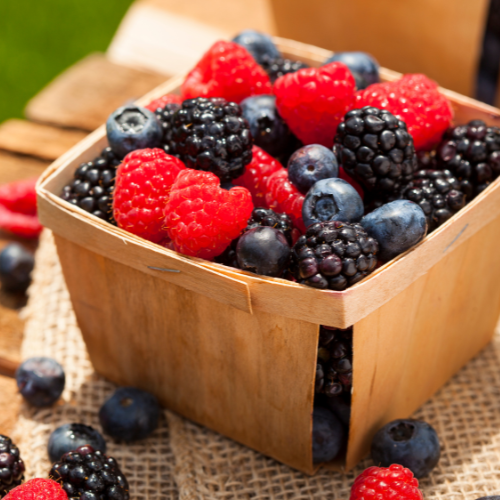
Berries are rich in polyphenols, antioxidants, and vitamin C, which help combat oxidative stress and inflammation.
These small but mighty fruits have been linked to a reduced risk of cancer, heart disease, and neurodegenerative conditions. Blackberries, in particular, are among the highest in antioxidants.
3. Alliums (Garlic, Onions, Chives, and Leeks)
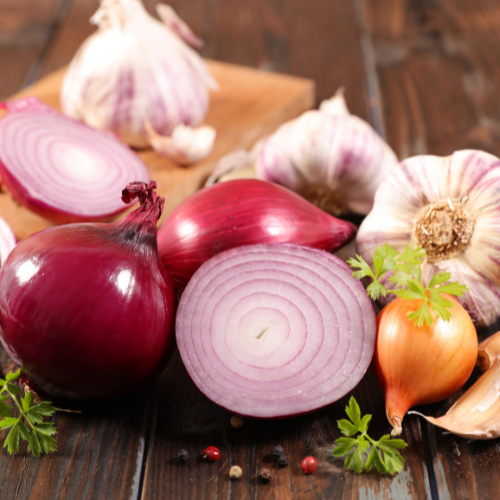
Allium vegetables contain organosulfur compounds that help prevent inflammation and may reduce the risk of certain cancers.
They also contain quercetin, a flavonol that has been shown to alleviate symptoms of rheumatoid arthritis and may benefit autoimmune conditions like multiple sclerosis and lupus.
4. Ginger
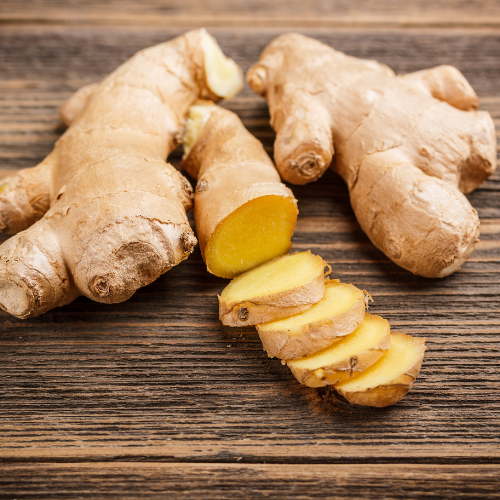
Ginger is a staple in many households for digestive support, but its benefits go far beyond that. It has powerful anti-inflammatory properties that help protect against chronic disease and inflammation-related conditions.
Research suggests that ginger can help improve serotonin levels in the gut and brain, further reducing inflammation.
5. Turmeric
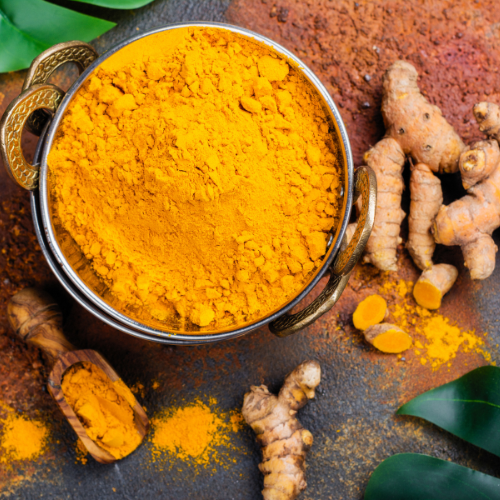
Turmeric, often called the “King of Spices,” is renowned for its anti-inflammatory power. Its active compound, curcumin, has been shown to block inflammation through multiple pathways.
Turmeric is beneficial for conditions such as osteoarthritis, type 2 diabetes, high cholesterol, depression, and certain types of cancer.
6. Cacao
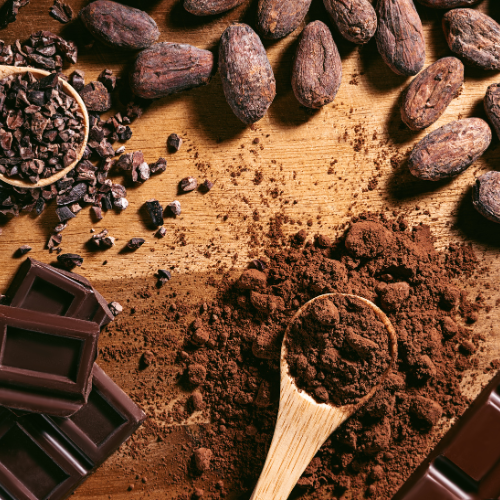
Raw cacao (not processed chocolate) contains antioxidants, flavonoids, and polyphenols that help reduce inflammation and improve heart health. It also contains magnesium, crucial for relaxing the muscles and reducing stress-related inflammation.
7. Nuts and Seeds
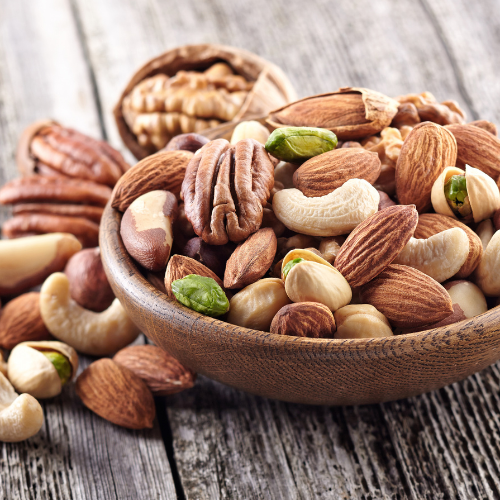
This is a weak spot for me because I love nuts and often overindulge:-)
Nuts and seeds are rich in healthy fats, antioxidants, zinc, magnesium, and vitamin E, all of which help to fight inflammation.
Nuts & seeds contain lectins, (protein in plants and eating too much eating too much can damage the lining of your intestine. They also contain excess phytate which can affect the body’s ability to absorb iron. So be mindful of how much you consume.
According to the American Dietary Guidelines, a daily serving of around 1 ounce (about 28-30 grams or a small handful) of nuts and seeds is recommended for most adults.
Studies show that consuming one ounce of nuts daily can reduce overall mortality risk by 20%.
Best Nuts & Seeds to Include:
- Pecans
- Hazelnuts
- Pistachios
- Almonds
- Brazil nuts
- Macadamia nuts
- Cashews
- Pumpkin seeds
- Chia seeds
- Ground flaxseeds
- Hemp seeds
- Sesame seeds
Limit or Avoid:
- Nuts coated in sugar
- Nut butter with added oils, salt, or sugar
- Peanuts (consume in moderation)
Nuts and seeds, especially walnuts, flaxseeds, and chia seeds, are high in omega-3 fatty acids, which are essential for reducing inflammation and promoting overall health.
Chronic inflammation doesn’t have to control your health. You can take charge of your well-being by making mindful dietary choices and eliminating toxins from your lifestyle.
If you’re looking for a way to jumpstart your journey to better health, sign up for my Free Detox Masterclass to learn how to remove excess inflammation from your body. Stay tuned for more details in your inbox!
Ready to take the next step?
Sign up for my free detox masterclass and learn how to reduce inflammation further and revitalize your body!
Details about the Masterclass
🗓 Webinar Topic: Detox Masterclass: How to Reset Your Hormones, Shed Weight & Boost Energy Naturally!
📅 Date: April 8, 2025
⏰ Time: 7 PM EST
💻 Where: Online Via ZOOM (link will be sent upon registration)
🔗 Click Here to Save your spot now
✨When you register for this class you will get one of my most popular FREE resources: 45 Fat Burning Tips For Women Over 40
In Good Health,
Deon
DISCLAIMER: This information is not intended to provide medical advice. The purpose is to provide education and a broader understanding to my readers. Always seek the advice of your qualified clinician or healthcare provider before making any dietary or lifestyle changes. I do not recommend or prescribe, or recommend changing dosage or discontinuing, any prescription medications or pharmaceutical drugs.
Source: Foodrevolution.org


